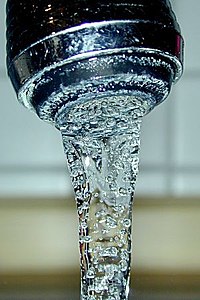
Photo from wikipedia
Although water is an essential commodity with virtually no substitute, poor bill payment on the part of water utility customers is constraining the effort of water utility companies, especially those… Click to show full abstract
Although water is an essential commodity with virtually no substitute, poor bill payment on the part of water utility customers is constraining the effort of water utility companies, especially those in developing countries to sustain and expand its provision. In this backdrop, this article investigates the interrelationship and impact of a set of attitudinal and institutional factors on the bill payment behavior of water utility customers of Ghana. A conceptual model of payment behavior is developed and tested using data from a cross-sectional survey of households in the Greater Accra Region of Ghana (GARG) and the billing records of Ghana Water Company Limited (GWCL). Among the constructs considered in the analysis, service quality, corporate image, and monitoring and control are found to be the major determinants of customer satisfaction toward the water utility, which in turn, together with the direct influence of monitoring and control measures and transaction time at bill payment points, explains a significant part of the total variation in water customers’ bill payment behavior. We provide in-depth discussion and policy implications of our findings.
Journal Title: SAGE Open
Year Published: 2017
Link to full text (if available)
Share on Social Media: Sign Up to like & get
recommendations!